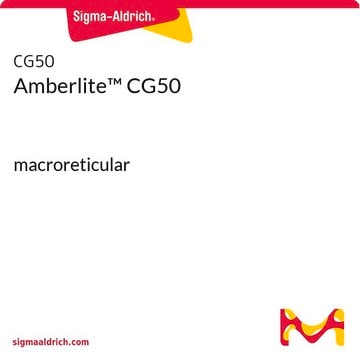G1910
Gomme gellane
Gelrite®
Synonyme(s) :
Agent gélifiant de substitution à l’agar-agar
About This Item
Produits recommandés
Niveau de qualité
Application(s)
agriculture
Vous recherchez des produits similaires ? Visite Guide de comparaison des produits
Description générale
Application
- in the synthesis of gellan-pullulan nanogel via chemical crosslinking
- in the synthesis of gellan-pullulan hydrogel
- with KNOP medium to maintain and prepare Anthoceros agrestis thallus tissue sample for imaging
- in the synthesis of gellan-pullulan nanogel via chemical crosslinking
- in the synthesis of gellan-pullulan hydrogel
- with KNOP medium to maintain and prepare Anthoceros agrestis thallus tissue sample for imaging
Caractéristiques et avantages
- Transparent and colorless agar alternative
- Mechanically robust
- Disperses in water with ease
- Low viscosity
- The resulting gel has a high melting temperature
Informations légales
Code de la classe de stockage
11 - Combustible Solids
Classe de danger pour l'eau (WGK)
WGK 2
Point d'éclair (°F)
Not applicable
Point d'éclair (°C)
Not applicable
Équipement de protection individuelle
Eyeshields, Gloves, type N95 (US)
Certificats d'analyse (COA)
Recherchez un Certificats d'analyse (COA) en saisissant le numéro de lot du produit. Les numéros de lot figurent sur l'étiquette du produit après les mots "Lot" ou "Batch".
Déjà en possession de ce produit ?
Retrouvez la documentation relative aux produits que vous avez récemment achetés dans la Bibliothèque de documents.
Les clients ont également consulté
Protocoles
Reference guide and preparation guide for antibiotic and antimycotic use in plant tissue culture.
Reference guide and preparation guide for antibiotic and antimycotic use in plant tissue culture.
Reference guide and preparation guide for antibiotic and antimycotic use in plant tissue culture.
Reference guide and preparation guide for antibiotic and antimycotic use in plant tissue culture.
Notre équipe de scientifiques dispose d'une expérience dans tous les secteurs de la recherche, notamment en sciences de la vie, science des matériaux, synthèse chimique, chromatographie, analyse et dans de nombreux autres domaines..
Contacter notre Service technique















